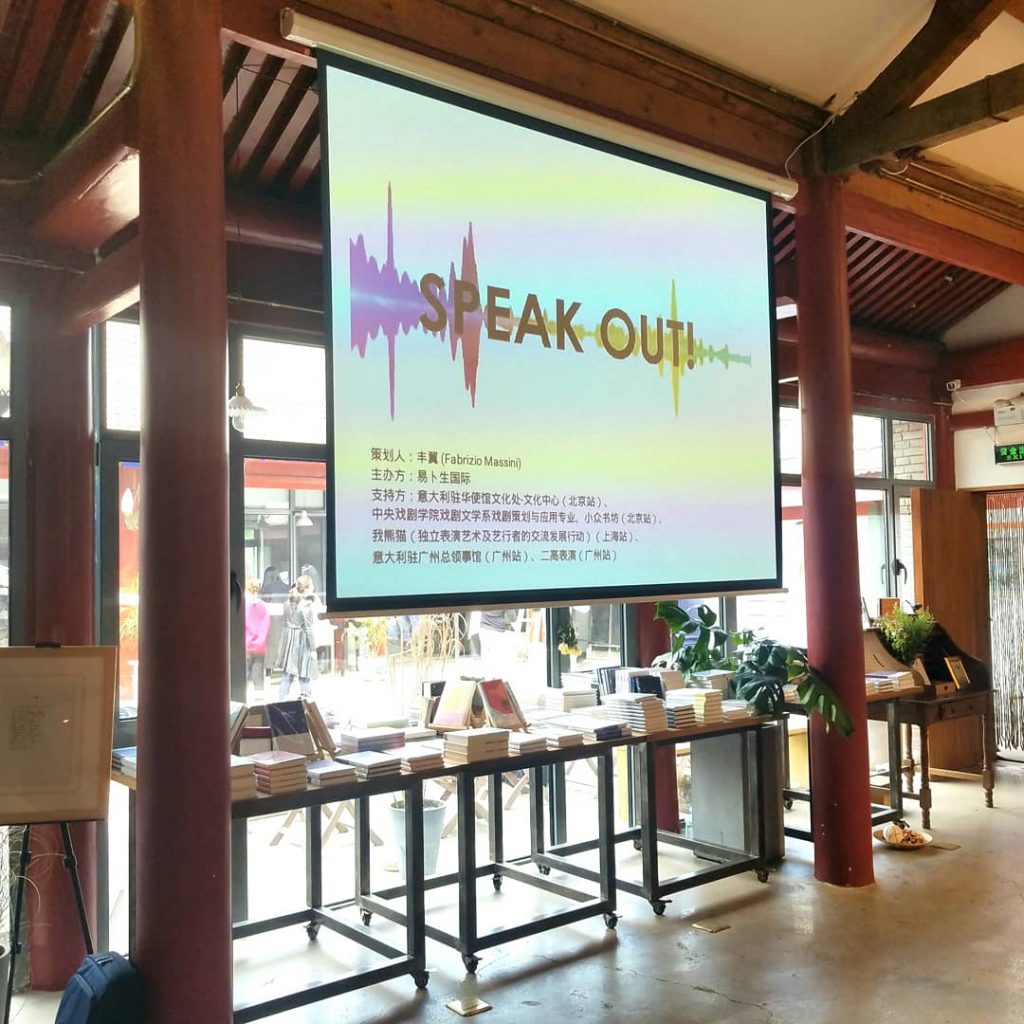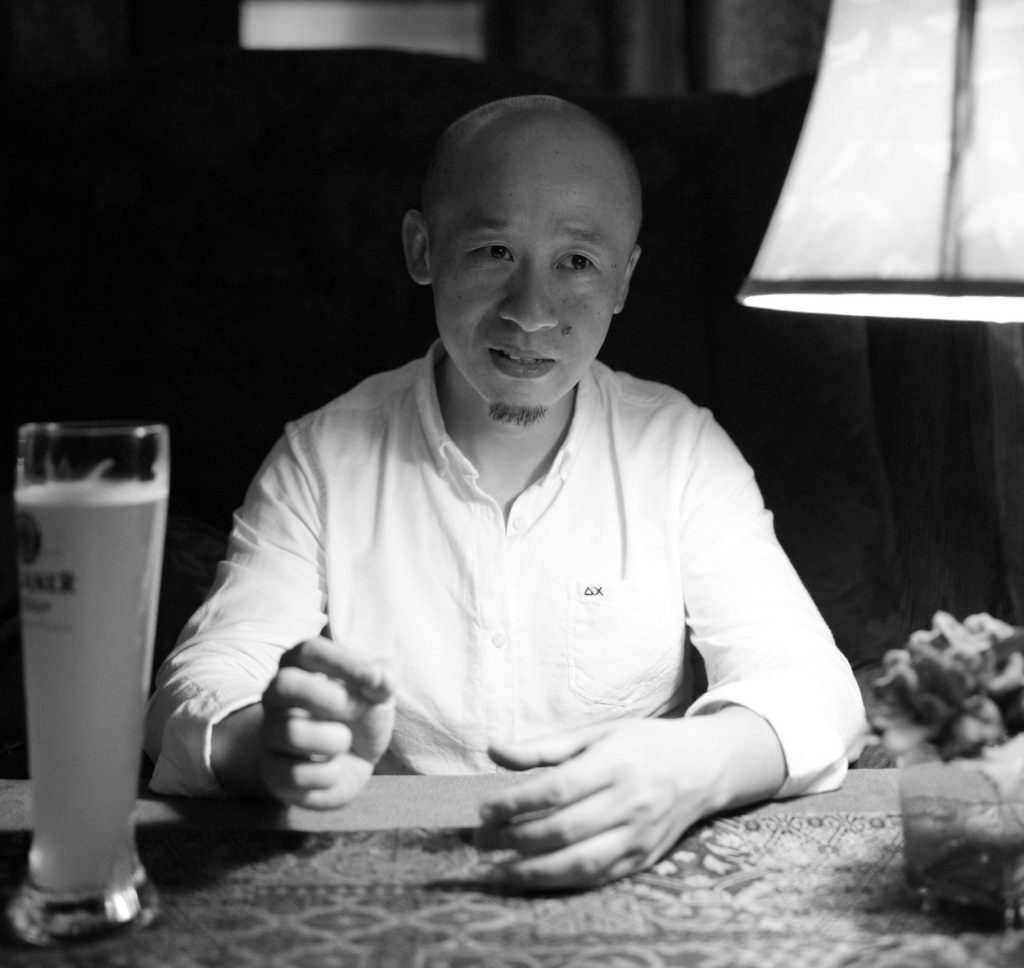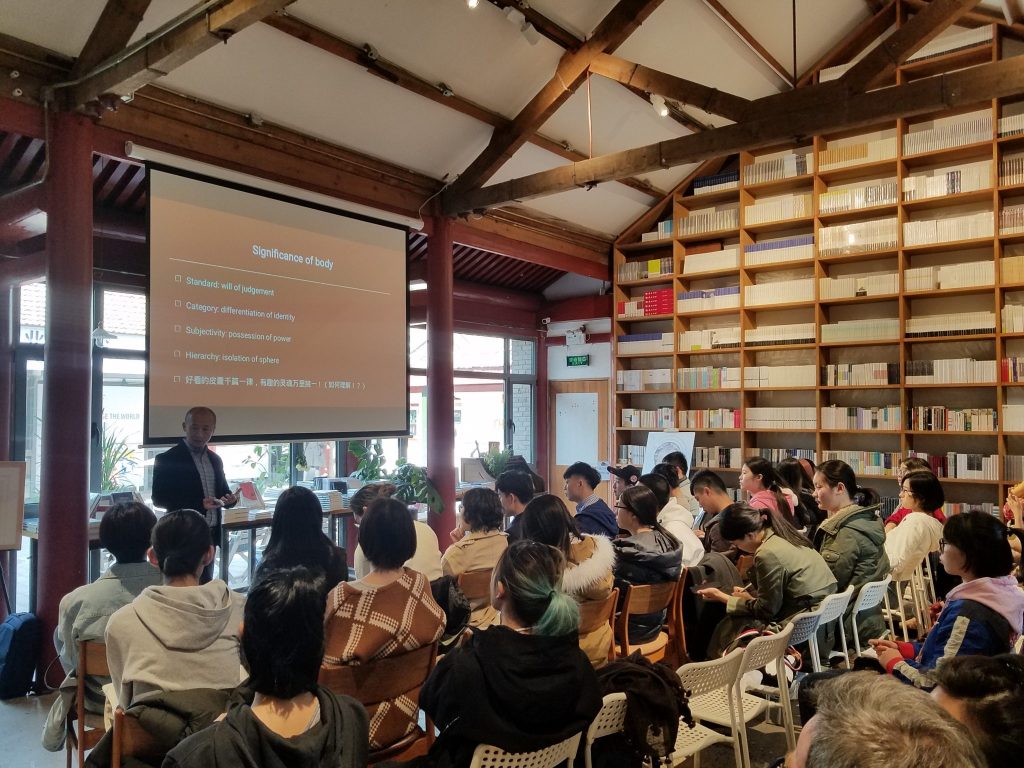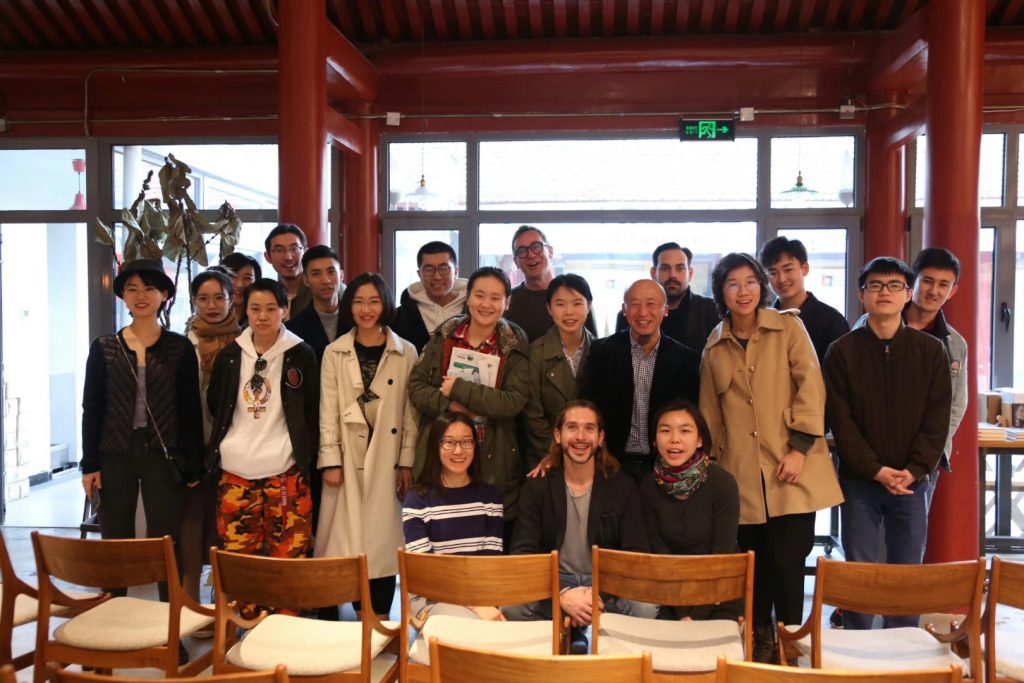-
Calendar 2025
Calendar 2024
Calendar 2023
Calendar 2022
Calendar 2021
Calendar 2020
-
Children of Ginko – Preview
31 October, Shanghai
-
Children of Ginko – Premiere
7-8 November, Shanghai,
Calendar 2019
-
Dance Dramaturgy 2.1
23-23 April, Aosai Space, Dali
-
New Text New Stage – “A Deal” Australian Premiere
23-31 August, Sydney
Calendar 2018
-
Web Traffic — A Multimedia Dance Theatre
Jan.5-7th , Shanghai International Dance Center
-
China ComingOUT – Creative Writing for LGBTQ Youth
31st Jan.-4th Feb. , Destination, Beijing.
-
SPEAK OUT: #1 LGBTQ&Perfromance BJ
7th, April , Italian Institute of Culture, Beijing
-
SPEAK OUT: #2 Performance&Performativity
8th, April , Xiaozhong Bookstore, Beijing
-
SPEAK OUT: #1 LGBTQ&Perfromance SH
10th, April , NEXTMIXING, Shanghai
-
SPEAK OUT: #1 LGBTQ&Perfromance GZ
12th, April , Ergao Dance Production Group, Guangzhou
-
SPEAK OUT : #3 Gender, Documentary and Activism
19th, May, Bookworm, Beijing
-
China ComingOUT – Creative Writing for LGBTQ Youth
23rd, May-26th, May , Zizai Studio, Shanghai
-
LookOUT- Arts Festival on Gender
July 6-15, 2018, Beijing, 798 Art District
-
Let You Be rerun in Beijing Penghao Theatre
26-27th, July , Penghao Theatre, Beijing
-
I Disappear Premiere in Beijing
28th, 29th, July , Penghao Theatre, Beijing
-
Dance Dramaturgy Workshop I
27th,Aug.-2nd, Sep., Free Theatre Alliance Rehearsal Center, Beijing
-
China ComingOUT——Creative Writing for LGBTQ Youth
25th-28th, October , There Art Center, Guangzhou
-
Dance Dramaturgy Workshop II
30th, Oct.-1st, Nov. , Free Theatre Alliance Rehearsal Center
-
MOVING WOR(L)DS – International forum on theatre & migration
7-17th December , Nanjing University, Nanjing, Jiangsu Province, China
Calendar 2017
-
“When Swallows Cry” South African Premiere Reviews
January, Market Theatre Complex, Newtown Johannesburg Gauteng South Africa
-
Frozen Songs Excerpts Presented at Shanghai Project Chapter 2 Opening
April , Shanghai Himalayas Museum
-
The Returning/ Winterreise with Chinese Cast Premiere in Shanghai
21st-23th, July, Shanghai Huangpu Theatre; 28th-29th, July, Penghao Theatre Beijing
-
I Disappear Stage Reading in Penghao Theatre Beijing
July 26th, 14:30/19:30 Penghao Theatre
-
Frozen Songs Premiere at The Arctic Theatre
September,7th, Tromsø, Norway, Arctic Theatre(Hålogaland Teater )
-
Disco-Teca at STOFF – Stockholm Fringe Festival
9th, September, Teater Tre, Stockholm, Sweden
-
Let You Be Premiere in Beijing
September, 25th-26th, 7:30pm Qinglan Theatre
-
Let You Be Tour in Hangzhou Contemporary Theatre Festival
28th, September, Zhejiang Province Culture Center Small Theatre.
-
Disco-Teca at We Festival of Future Shanghai
October, 7th-8th, No.6 Space, West Bund Camp 3399, Shanghai
-
New Text New Stage II Tatarstan Production Premiere
14th, 15th, 17th, October, 2017, Galiaskar Kamal Tatar National Academic Theatre, Tatarstan
-
New Text New Stage II Chinese/American Production Coming Up
Nov 15th-Dec.10th, Urban Stages Theatre, New York. Sep.24th-30th, Nanjing University, Jiangsu, China.
-
About My Parents and Their Child Touring in Shanghai
December, 9th-10th, Shanghai Dramatic Art Center 1933 Micro Theatre.
-
Contextualizing Dance Dramaturgy – Workshop Series BJ
Dec. 22nd , Goethe Institut China, Beijing
-
Contextualizing Dance Dramaturgy – Workshop Series GZ
Dec. 25th , Ergao Dance Production Group, Guangzhou
-
Contextualizing Dance Dramaturgy – Workshop Series SH
Dec. 30th , Camp 3399 #6 Space, Shanghai
Calendar 2016
-
Night Shift, Beijing rerun
8-9 January, Qinglan theatre, Beijing
-
Ghost 2.0, Beijing rerun
21st-24th, Jan. , Beijing Tianqiao Performing Arts Center
-
SEEDS – A Global Art and Media Project
1-11th, March, Drum Tower West Theatre, Beijing, China
-
Sleeping Beauties—Dancing & Multimedia Workshop Demonstration
6th, March, Drum Tower West Theatre, BJ
-
NEW TEXT, NEW STAGE II – Session 3
20th-26th, March , Guangzhou Dramatic Art Center. There Art Space in GZ
-
Free Theater Alliance – Launch of 1-2-3 Theatre
April, 18th, Qinglan Theater, Beijing
-
Jon Fosse’s Dream of Autumn BOOK LAUNCH
23 April, JEWELVARY Art & Boutique
-
PRACTICAL RETHORIC Workshop (SH)
6月19日, Internet Education Plaza, Shanghai
-
PRACTICAL RETHORIC Open Demonstration (GZ)
July 2, There Art Space, Guangzhou
-
Disco-teca Open Presentation (GZ)
July 9, Guangdong Times Museum, Guangzhou
-
PRACTICAL RETHORIC Open Demonstration(SH)
July 10, RSDBT. Shanghai
-
DISCO-TECA in Shanghai
July 12-13, 1933 Micro Theatre
-
Disco-teca Open Presentation (SH)
July 15, RSDBT, Shanghai
-
In the Field of Hope
July 18-19, Gulou West Theatre
-
About My Parent and Their Child
July23-24, Gulou West Theater · Beijing
-
DISCO-TECA in Beijing
July 23-24, Gulou West Theatre
-
Ghost 2.0 at Wuzhen Theatre Festival
13th, 14th October , Wuzhen, China
-
Workshop by Jon Tombre
12th-13th, November, FTA Rehearsal Space, Beijing
Calendar 2015
-
Practical Rhetoric – Workshop 1
13-18 March, Beijing, Here&Now Studio
-
New Takes on IBSEN
April, 22nd-26th, Shanghai, China
-
Ibsen in One Take – Shanghai 2015
23-24 April, Himalaya Center, Shanghai
-
Night Shift – Norwegian Tour
May 27, 30, Lilehammer, Oslo
-
Practical Rhetoric – Workshop 2
24-28 June, Beijing, Here&Now Studio
-
NEW TEXT, NEW STAGE II – Session 1
13-18 July 2015, Pioneer Theatre, Beijing
-
GHOSTS 2.0
7-9 August, McaM Museum, Shanghai
-
Comedy of Love, Premiere
30th, Sept.-4th, Oct., Penghao Theater, BJ
-
Practical Rhetoric – Workshop 3
3-7 October, Here&Now Studio, Beijing
-
Workshop on Jon Fosse
Oct. 5th-10th , Sheung Wan Municipal Services Building, HK
-
Practical Rhetoric: Launch at Norwegian Embassy
8 October, Norwegian Embassy, Beijing
-
DISCO-TECA, open workshops
10-14 October, Guangzhou
-
Practical Rhetoric:Workshop at Bernard Controls
10 October, Bernard Controls China, Beijing
-
NORA – Norwegian Tour 2015
October 28 - November 3, Bodø; Tromsø; Trondheim
-
DISCO-TECA, premiere
4-5 November, Gender Bender Festival, Bologna
-
Night Shift Guangzhou Tour
13-15th, November, Guangzhou Dramatic Art Center
-
NEW TEXT, NEW STAGE II – Session 2
Nov. 15th-22nd, Shanghai Ming Contemporary Museum, Shanghai Dramatic Art Center
-
Night Shift Shanghai Tour
21-22, November , Shanghai Dramatic Art Center
-
DISCO-TECA: live performances & media feedback
December, 17th, DPAC, Malaysia
Calendar 2014
-
Artists’ Talk Series 1: Architecture and Scenography
January 21 - 27th, Ibsen International Office, Beijing
-
Artists’ Talk Series 1: New Media and Theatre
29th March, Ibsen International Office, Beijing
-
New Texts, New Stage – Session 3
5th - 10th May 2014, Pioneer Theatre, Beijing
-
HEDVIG from the Wild Duck – Oslo
14-16th August, Oslo Opera House, Norway
-
GHOSTS 2.0
6-7 September, Beehive theatre, Beijing
-
Artists’ Talk Series 1: Drama, Communication and Society
7th September, Ibsen International Office, Beijing
-
Ibsen in One Take – Ibsen Festival Oslo
12th September, Oslo,
-
Night Shift – Beijing Fringe Festival
16th-17th September, Beijing Fringe Festival
-
Ibsen in One Take – OzAsia Festival
16-17th September, Adelaide,
-
The phenomenon: Hedda Gabler
11th-12th October, Penghao Theatre, Beijing
-
Night Shift – Beijing Rerun
13th October, Gulou West Theatre. Beijing
-
NORA – World premiere
30-31 October, Tianjin Grand Theatre, Tianjin
-
Jo Strømgren Kompanis at Guandong Modern Dance Festival
November 10-12,2014, Xinghai PA Garden,Guang Zhou, China
-
Jon Fosse’s Blossoms In Shanghai International Contemporary Theatre Festival 2014
November 21-29,2014, Shanghai Dramatic Arts Centre, China
Calendar 2013
-
New Texts, New Stage – Session1
16th - 20th April, Star Theatre, Beijing
-
HEDVIG from the Wild Duck
28-29th June, Kwai Tsing Theatre Auditorium, Hong Kong
-
HEDVIG from the Wild Duck – Beijing
23rd July, People Liberation's Army Theatre, Beijing
-
Carcass
26th July 2013, Star Theatre, Beijing
-
Ibsen in One Take – Netherlands
27 - 28th September, Rotterdam
-
Ibsen in One Take – China tour
13 - 16 November, Guangzhou and Shanghai
-
New Texts, New Stage – Session2
23rd November - 1st December, Penghao Theatre, Beijing
-
The Name – Jon Fosse
28 November - 15 December, Shanghai
Calendar 2012
-
The Jon Fosse Project in China
-
The Name
7-11 March, 2012, New Space Theatre, Shanghai
-
Dance Workshop in Beijing with Johannessen for LDTX
13 - 25 April 2012, Beijing
-
Writing Text for Opera
October 11th - 13th 2012, Bergen
-
Field Works
November 22nd - 30th, Macau, Guangzhou, Shenzhen
-
Ibsen in one take
28th November - 1st December, Beijing
-
RETURN _ a devised dance piece
27th November - 6th December, Guangzhou Modern Dance Festival; Singapore Connect Festival.
Calendar 2011
-
Workshop collaboration
23-24 April, Tianqiao Theatre Beijing
-
Masterclass by choreographer Ingun Bjørnsgaard
25 July, Guangzhou
-
Building International Network – seminar Guangdong Moderne Dance Festival
26 July at 11.00, Guangzhou
-
The Name by Jon Fosse, production The New Norwegian Theatre
23 September at 19.15, Venue: The New Stage at Shanghai Theatre Academy, 630 Huashan Rd, Shanghai
-
The Name by Jo Fosse, production The New Norwegian Theatre
24 September at 15 and 19.15, Venue: The New Stage at Shanghai Theatre Academy, 630 Huashan Rd, Shanghai
-
The second Ibsen Festival for Students in China
21 – 23 October, Nanjing
-
The Jon Fosse Project in China
November 4, 2011, 20:00 , The New Space at Shanghai Theatre Acedemy, 630 Huashan Rd., Shanghai, in collaboration with TTS Group
-
International Seminar: Staging Ibsen Today
31 October – 4 November, Beijing
Calendar 2010
-
Ibsen live in China – an exhibition
5 October - 4 November, Hangzhou, Shanghai, Nanjing and Beijing
-
The Lady From the Sea
5 and 6 October 2010, Hangzhou
-
The Lady From the Sea
14 and 15 October, Yi Fu Stage, Shanghai
-
Symposium on Ibsen and Interculturalism in China
15 October, Shanghai Theatre Academy
-
A Doll’s House
22, 23 and 24 October, Capital Theatre, Beijing
-
China International Ibsen Festival for Students
22, 23 and 24 October, Nanjing University
-
Workshop based on Jon Fosse’s work
25 - 29 October, Shanghai Theatre Academy
-
Someone Is Going to Come by Jon Fosse
26 October to 4 November 2010, New Theatre Stage, Shanghai Theatre Academy
-
Speak OUT Series — Lecture 2: PERFORMATIVITY OF QUEERNESS
SPEAK OUT – Gender takes center stage
 What’s different scares us, but also makes us curious. Like ignorance generates fear, so does understanding lead to acceptance. And creates the possibility for beauty.
What’s different scares us, but also makes us curious. Like ignorance generates fear, so does understanding lead to acceptance. And creates the possibility for beauty.
In the SpeakOUT series, performing artists and academics from China and abroad turn the spotlight on gender. What does it mean to “perform gender” in our daily life? How does the body “talk” on stage? How are gender norms changing around the world? And what role can performing arts play in this change?
GENDER & PERFORMANCE
Like actors in a play, it is not our physical body that creates our “character” within society. Through costumes, make-up, the tone of voice and quality of the movements, each of us perform a role (man, woman) that changes in different scenes (single, married, wife, son, etc). If we follow the script we get to play the Goody (a Real Man, a Respectable Woman etc). If we don’t, we are left with the Villain or the Misfit (the Pervert, the Spinster etc).
But what if we wanted a different plot? What if we threw away stock characters and create a multifaceted role for ourselves? Like Nora says in “Doll’s House”, before all else, before all roles and labels, we are human beings. We have the power to change the script, and make our life an unforgettable show.
LECTURE 3: PERFORMANCE & PERFORMATIVITY OF QUEERNESS
“Bodies  matter”, as Judith Butler points out. For artists who employ their bodies in performance, how to identify, perceive, and present their bodies is vital for the creativity, authenticity, and expression of their art works. Living in a heteronormative social environment where various walls have been erected (heterosexuality VS homosexuality, normal VS pervert, legal VS illegal), artists need to question their socially given subjectivity in order to achieve a breakthrough. In this context “queer” refer not only to sexual and gender minorities, but also to the abnormality, deviance, and alternative ideologies and lifestyles of marginal communities. The “performance of queerness” can produce an effect of theatricality, as a sign empty of meaning and the meaning of all signs.
matter”, as Judith Butler points out. For artists who employ their bodies in performance, how to identify, perceive, and present their bodies is vital for the creativity, authenticity, and expression of their art works. Living in a heteronormative social environment where various walls have been erected (heterosexuality VS homosexuality, normal VS pervert, legal VS illegal), artists need to question their socially given subjectivity in order to achieve a breakthrough. In this context “queer” refer not only to sexual and gender minorities, but also to the abnormality, deviance, and alternative ideologies and lifestyles of marginal communities. The “performance of queerness” can produce an effect of theatricality, as a sign empty of meaning and the meaning of all signs.
In this lecture, Dr. Wang introduces the theoretical basics of queer theory and its intersection with performance/performativity. Moreover, he explores how the dance-theatre performance “Disco-TECA” fuses academic research, stage craft, and offstage activity together, thus perform the performativity of sexuality, gender, and queer in the “carnivalesque” of Disco from the 1980s to the 2010s.
Curator: Fabrizio Massini
Produced by: Ibsen International
TIME & LOCATION:
8th May, 14:00
Location:Xiaozhong Bookstore, Beijing
About the Lecturer: Dr. QIAN WANG
Qian Wang. Dr Qian Wang earned his PhD in popular music studies from the Institute of Popular Music, the University of Liverpool, and did his post-doctoral research at the Department  of Sociology, Tsinghua University. He is currently a visiting scholar at the School of Literature and Journalism, Sichuan University, and a visiting scholar of Fudan Journalism School. His research is mainly focused on the interrelationship between Chinese/Sinophone popular music and China’s society. He is interested in issues such as sexuality, gender, queer, politics, and social movements, which objectively reflect the transformation of China since the economic reform in 1979.
of Sociology, Tsinghua University. He is currently a visiting scholar at the School of Literature and Journalism, Sichuan University, and a visiting scholar of Fudan Journalism School. His research is mainly focused on the interrelationship between Chinese/Sinophone popular music and China’s society. He is interested in issues such as sexuality, gender, queer, politics, and social movements, which objectively reflect the transformation of China since the economic reform in 1979.
In 2015 Qian joined Ibsen International’s dance theatre performance “Disco-Teca” as a cultural consultant. Besides providing the artistic team with in-depth knowledge about disco music’s social, political and cultural context, Qian follows the production to give lectures and attend Q&A discussion, thus giving this production a truly interdisciplinary (performative+academic) profile.

